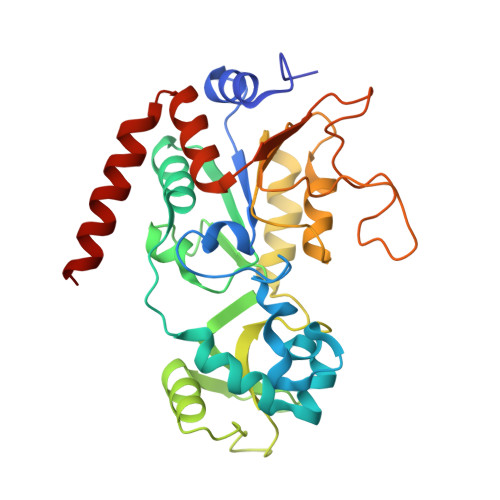Structural basis for the activation and inhibition of Sirtuin 6 by quercetin and its derivatives.
You, W., Zheng, W., Weiss, S., Chua, K.F., Steegborn, C.(2019) Sci Rep 9: 19176-19176
- PubMed: 31844103
- DOI: https://doi.org/10.1038/s41598-019-55654-1
- Primary Citation of Related Structures:
6QCD, 6QCE, 6QCH, 6QCJ, 6QCN - PubMed Abstract:
Mammalian Sirtuin 6 (Sirt6) is an NAD + -dependent protein deacylase regulating metabolism and chromatin homeostasis. Sirt6 activation protects against metabolic and aging-related diseases, and Sirt6 inhibition is considered a cancer therapy. Available Sirt6 modulators show insufficient potency and specificity, and even partially contradictory Sirt6 effects were reported for the plant flavone quercetin. To understand Sirt6 modulation by quercetin-based compounds, we analysed their binding and activity effects on Sirt6 and other Sirtuin isoforms and solved crystal structures of compound complexes with Sirt6 and Sirt2. We find that quercetin activates Sirt6 via the isoform-specific binding site for pyrrolo[1,2-a]quinoxalines. Its inhibitory effect on other isoforms is based on an alternative binding site at the active site entrance. Based on these insights, we identified isoquercetin as a ligand that can discriminate both sites and thus activates Sirt6 with increased specificity. Furthermore, we find that quercetin derivatives that inhibit rather than activate Sirt6 exploit the same general Sirt6 binding site as the activators, identifying it as a versatile allosteric site for Sirt6 modulation. Our results thus provide a structural basis for Sirtuin effects of quercetin-related compounds and helpful insights for Sirt6-targeted drug development.
- Department of Biochemistry, University of Bayreuth, 95445, Bayreuth, Germany.
Organizational Affiliation:



















